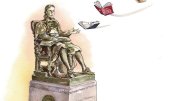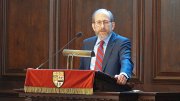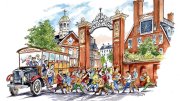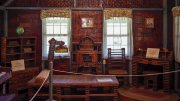1921
The Bulletin’s editors note that Harvard has dedicated no new buildings for several years, due to the high cost of construction. With a bumper crop of freshmen expected, existing facilities will likely be taxed to capacity or beyond.
1936
Three missing books from John Harvard’s personal collection, dating from the late sixteenth and early seventeenth centuries, are found tucked away in the Divinity School Library. The religious works include an edition of the New Testament printed in 1598.
1956
Construction to expand the Eliot House dining hall begins—an attempt to preserve the tradition of leisurely mealtimes. Due to overcrowding, the editors explain, “it is difficult for one to prolong a postprandial conversation when one knows that others are searching for a place to sit down.”
1971
Undergraduate columnist Michael E. Kinsley ’72 reports from his summer internship with Nader’s Raiders in Washington, D.C., that several fellow interns have been sponsored by the Kennedy School’s Institute of Politics, and concludes: “So we can only hope that the Naders will balance off some of the discredited policy-makers from Harvard, and resupply some sort of legitimacy to our own generation of riders on the Cambridge-Washington circuit.”
1996
Professor of psychiatry George E. Vaillant publishes the results of a long-term study of male alcohol abusers, including the fact that 21 percent of college men and 33 percent of inner-city men abused liquor at some point in their lives. Among the participants were 268 College alumni.
2001
Photographers visiting Massachusetts Hall to record the doings of President Larry Summers on his first day in office find an accouterment novel in Harvard presidential history: a personal computer.
2006
The University Planning Committee for Science and Engineering releases a preliminary report outlining a sweeping strategy to strengthen science at Harvard. Proposals include adding up to 140 new faculty positions within the decade and stressing more hands-on learning experiences for undergraduates.








